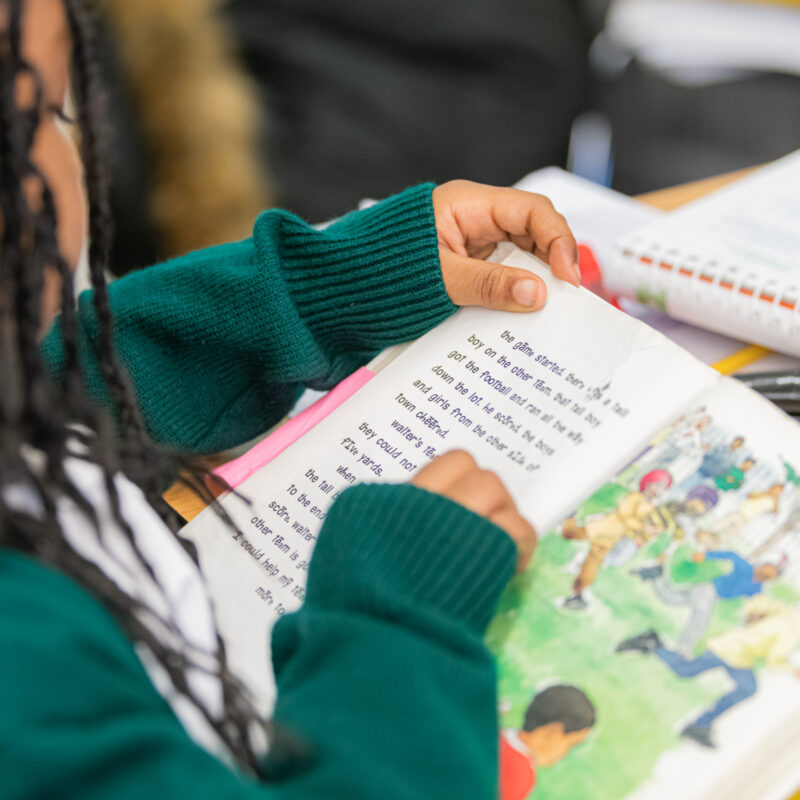By Juliana Worrell
Juliana Worrell, Uncommon Schools’ Chief Schools Officer K-8, advocates for strong literacy instruction using the principles of the science of reading. Read this op-ed as it originally appeared on January 20, 2024 in NJ Star-Ledger. (Subscription may be required.)
In his State of the State message, Gov. Phil Murphy called for introducing new initiatives to teach children in the state “the fundamentals of reading — like sounding out letters and combining them into words.”
“It is simple: an emphasis on phonics in reading instruction is essential to the lifelong success of our children,” the governor said.
As the head of K-8 education for the Uncommon Schools network, which educates more than 19,000 students, including 8,000 mostly economically disadvantaged students in Camden and Newark, I couldn’t agree more with the governor. What we need to do now is make the science of reading the standard curriculum in the state and support quality training for teachers in every classroom.
One of the most critical milestones in our children’s education is whether they are reading proficiently by the end of third grade. Until third grade, students are learning to read; after third grade, they are reading to learn.
In New Jersey, just 42% of third graders reached proficiency levels on the English Language Arts section of the New Jersey Student Learning Assessments (NJSLA) taken in the spring of 2023, down from 50% in the year before the pandemic and unchanged from 2022.
The results are far worse for Black and brown children living in our state’s urban areas.
In Newark, just 19% of third graders in district schools reached reading proficiency. In some schools in Newark, just one student in an entire third-grade class was proficient at grade level. Newark’s third-grade literacy results for 2023 were essentially unchanged from 2022, despite hundreds of millions of dollars from the federal government to address learning loss.
 Fortunately, this is not a problem without a solution. Researchers in neurology, linguistics, education, and psychology have spent decades studying the way children learn how to read, and today, we have a much better understanding of the science of reading.
Fortunately, this is not a problem without a solution. Researchers in neurology, linguistics, education, and psychology have spent decades studying the way children learn how to read, and today, we have a much better understanding of the science of reading.
The science of reading uncovers which skills are involved in reading and helps inform how we teach those skills to our youngest students. In its simplest form, students learn to sound out letters and combine them into words.
At Uncommon’s Newark network of schools, North Star Academy, where I have taught reading to elementary school students as well as coached teachers in literacy instruction, we have been using this approach since we launched our first North Star elementary school in 2007.
As a result, third graders at North Star Academy – the vast majority of whom are Black and brown and considered economically disadvantaged – were among the highest performing in Newark, with a 59% rate of reading proficiency, triple the rate of the city and almost 1.5 times the New Jersey state average.
Helping our children become strong readers is a crucial issue for our state and our nation.
A study by the Annie E. Casey Foundation found that students who reach fourth grade without being able to read proficiently are more likely to struggle academically and are four times more likely to drop out of school, which can lead to a number of issues in adulthood, including lower lifetime earnings and higher unemployment.
A study in the Journal of Emotional and Behavioral Disorders found that children with poor reading skills are more likely to engage in problem behaviors during adolescence.
The evidence is clear: Students lacking foundational literacy skills will struggle to reach their school, college, and career goals.
Unfortunately, too many school districts in New Jersey continue to teach children how to read using a “balanced literacy” approach that came into favor about 20 years ago but has since been shown to be ineffective because it devotes too little time to phonics instruction.
Since 2013, 32 states and the District of Columbia have passed laws or implemented new policies to require the science of reading instruction, according to Education Week. New Jersey is not among them.
In October, the New Jersey State Board of Education passed a resolution to revise the learning standards to incorporate key aspects of the science of reading. Advocates who pushed for the changes called the board’s decision “a positive, critical step.”
After evaluating nearly 700 teacher preparation programs across the country, the National Council on Teacher Quality found that New Jersey is among the lowest-performing states in the nation at preparing future educators to teach students how to read using methods based on the science of reading.
nation at preparing future educators to teach students how to read using methods based on the science of reading.
A report issued this week by the National Council on Teacher Quality identifies New Jersey as “weak” on policies that prepare and support teachers to implement and sustain the science of reading. New Jersey received that rating because the state does not set specific, detailed reading standards for teacher prep programs and does not require districts to select a high-quality reading curriculum.
Last year, a group of education advocates launched the New Jersey Legacy of Literacy Coalition to lobby for changes to address the literacy gap, including ensuring that schools of education in New Jersey are training teachers in the science of reading.
Teachers at Uncommon Schools are trained in the science of reading through rigorous professional development and constant coaching, but we would welcome new teachers who have learned the skills while in college. We also stand ready to share with others what we have learned.
I’m glad that Governor Murphy has recognized the need to make reading literacy a top priority of his administration. I urge the state Legislature to work swiftly to ensure our children are taught to read using the principles of the science of reading.
As the governor said, “it is essential to making New Jersey the best place to raise a child.”

